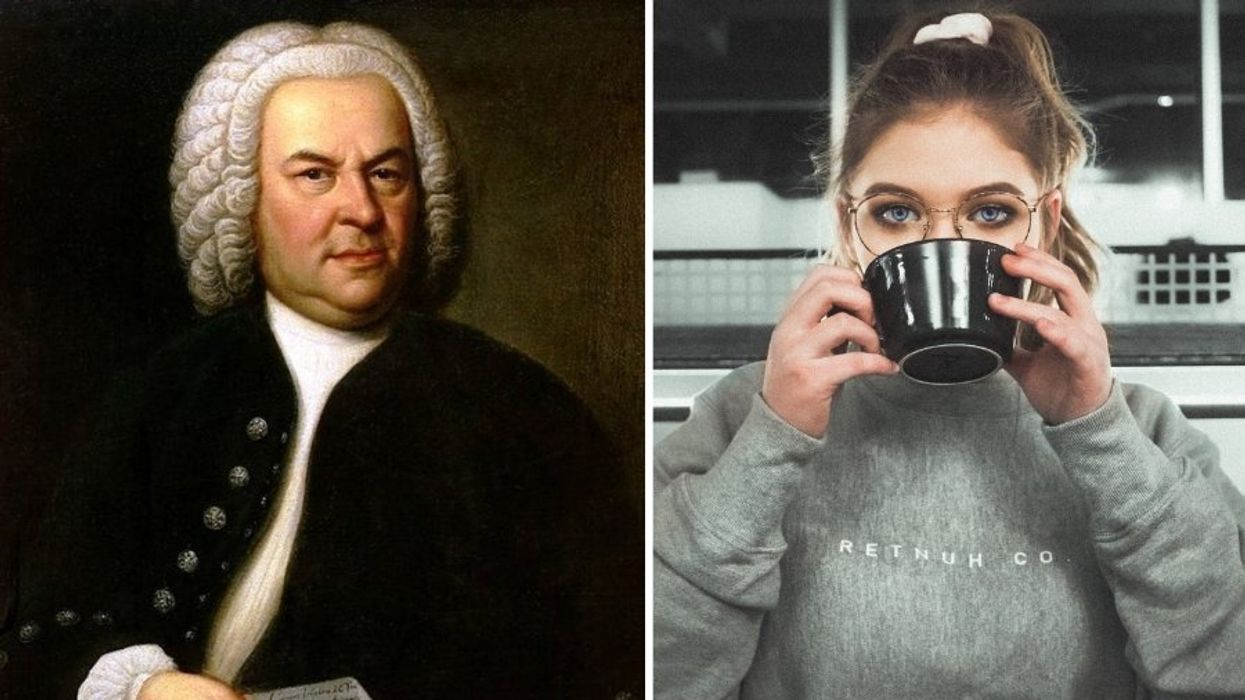
When you think of Johann Sebastian Bach, you might picture a bewigged man in tailcoats composing classical symphonies and concertos frequently associated with high-falutin’ society. At the very least, you probably don’t picture a comedian.
But “the father of classical music” had a silly side, and it came out in full force in his nearly 300-year-old “Coffee Cantata” (aka “Schweigt stille, plaudert nicht,” or “Keep quiet, don’t chatter.”). In the “Coffee Cantata,” the voices we hear are a narrator who opens and closes the scene, a father (Herr Schlendrian) who has an issue with coffee-drinking women and Liesgen, his highly caffeinated daughter who is willing to give up anything for a cup o’ Joe.
For context, coffee was extreme popular in 18th-century Europe, with some people sanctimoniously thinking it was a bad habit that needed to be broken (hence the dispute between this father and his coffee-obsessed daughter). But anyone who loves coffee will appreciate Liesgen’s dedication to—and subversive deception to get—her three cups of java a day.
Witness and enjoy how the lyrics of Bach’s “Coffee Cantata” translate to English:
Narrator:
Keep quiet, don’t chatter
and hear what’s going on now:
Here comes Herr Schlendrian
with his daughter Liesgen.
He’s growling like a honey-bear –
hear for yourselves what she has done to him.
Herr Schlendrian:
Don’t we have with our children
a hundred thousand muddles!
What always every day I
say to my daughter Liesgen
goes in one ear and out the other.
You bad child, you wild girl!
Oh! If only I could have my way:
Get rid of coffee!
Liesgen:
Father, don’t be so hard!
If three times a day I can’t
drink my little cup of coffee,
then I would become so upset
that I would be like a dried up piece of roast goat.
Ah! how sweet coffee tastes!
Lovelier than a thousand kisses,
smoother than muscatel wine.
Coffee, I must have coffee,
and if anyone wants to give me a treat,
ah!, just give me some coffee!
Herr Schlendrian:
If you don’t give up coffee,
you won’t be going to any wedding
and you won’t go out walking either.
Liesgen:
Alright then!
Just leave me my coffee!
Herr Schlendrian:
(I’ll get the little minx now!)
I shan’t get you the latest fashion in just your size.
Liesgen:
I can easily do without that.
Herr Schlendrian:
You’re not to stand at the window
and you won’t see anyone going by!
Liesgen:
I don’t mind that either; but please, I beg you,
just let me keep my coffee!
Herr Schlendrian:
What’s more you won’t get from me
a silver or gold ribbon
to put on your bonnet!
Liesgen:
That’s fine! Just leave me my pleasure!
Herr Schlendrian:
You’re impossible Liesgen, you are,
you would give up everything I say?
(Girls with obstinate minds
are not easily won over.
But if you hit the right spot,
oh then you’re in luck.)
Now follow what your father says!
Liesgen:
In everything else, but not coffee.
Herr Schlendrian:
Well then! You must get used to the idea
that you won’t have a husband either.
Liesgen:
Oh yes! Father, a husband!
Herr Schlendrian:
I swear, that won’t happen.
Liesgen:
Until I can give up coffee?
Right! Coffee, remain forever untouched.
Father, listen, I won’t drink any at all.
Herr Schlendrian:
Then you’ll have a husband!
Liesgen:
This very day,
dear father, do it now!
Ah, a husband!
That’s just right for me!
If only it could happen at once,
so that at last instead of coffee
before I go to bed
I could get a lusty lover!
Narrator:
Now old Schlendrian goes off and looks out
for his daughter Liesgen
to see if he can get her a husband soon.
But Liesgen lets it be secretly known:
‘No suitor of mine should come to the house
unless he himself has promised
and it is written also in the marriage contract
that I shall be permitted
to make coffee whenever I want.’
The cat does not leave the mouse,
young ladies remain coffee addicts.
The mother loves her cup of coffee,
the grandmother drank it also.
Who can blame the daughters!
First of all, how fabulous is this? I think we coffee-loving women have a new theme song. Might even be worth learning some German so we can sing it in unison. Also, we need t-shirts that say, “In everything else, but not coffee.” Let’s make it happen. Send one to Grandma.
If you want to see how the “Coffee Cantata” sounds, here’s a charming performance of it by the Amsterdam Baroque Orchestra and Choir:
Bach as comic relief. Who knew?
